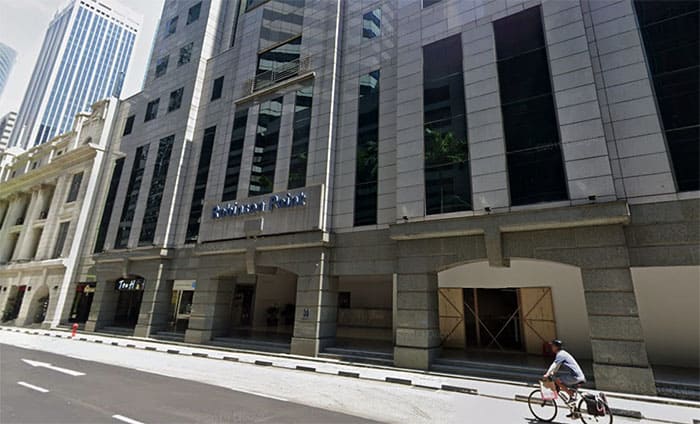Tuan Sing Holdings has agreed to sell the Robinson Point office building near Singapore’s Raffles Place central business district for S$500 million ($364.2 million), or 34 percent over the property’s book value, notching an above market deal after real estate investment in the Southeast Asian financial hub fell by more than two-thirds during the first six months of 2020.
The SGX-listed property developer said in a filing to the stock exchange late Friday that it will book an exceptional gain of S$128.3 million from the sale of the 21-storey building at 39 Robinson Road, which was valued by Colliers International at S$374.4 million as of end-2019. The company did not name the buyer, which it described as an unrelated party incorporated in the British Virgin Islands.
“The proposed divestment of Robinson Point is in line with our strategy of active capital recycling and highlights the continued strong demand for quality commercial spaces in Singapore amid the ongoing COVID-19 pandemic,” said William Liem, CEO of Tuan Sing.
“With this divestment, the group will be well positioned to make new strategic acquisitions in Singapore and across the region whenever opportunities arise.”
Selling at a Premium
Based on the selling price and the freehold building’s net lettable area of 133,830 square feet (12,433 square meters), the building is being sold at S$3,736 per square foot, according to Mingtiandi’s calculations. That’s a 45 percent premium to the S$2,570 per square foot which ARA Asset Management agreed to pay for the Robinson Centre, when it purchased that leasehold property in December for S$340 million.
The two buildings are within three minutes’ walk of each other along Robinson Road, a primary commercial street in Singapore which links the Raffles Place finance hub to the Tanjong Pagar area, however, brokers familiar with the market pointed to key differences between the two buildings.
“The main difference between Robinson Point and Robinson Centre is in the tenure,” said Galven Tan, deputy managing director of investment sales and capital markets at Savills in Singapore. “Robinson Point has a 999 year leasehold tenure, which is akin to freehold, whereas Robinson Centre has a 99 year lease of which approximately 76 years is remaining.”
Tan added that the buyer may see potential for redeveloping the property for other uses to capitalise on the CBD Incentive Scheme introduced by Singapore’s Urban Redevelopment Authority (URA) last year.
Tuan Sing pointed to that same policy in its statement, noting that the government plan grants higher plot ratios for redeveloping older office buildings in the financial district as mixed-use properties. Based on URA guidelines the property may be granted an additional 25 percent of GFA if it’s redeveloped with residential or hotel space added to the mix.
Tuan Sing had purchased Robinson Point, which sits on a freehold site at the corner of Robinson Road and Boon Tat Street overlooking the historic Lau-Pa Sat food court, in 2013 for S$348.9 million.
Bolstering the Balance Sheet
The divestment would “allow the group to continue pushing ahead in its transformation journey into a regional real estate player,” Tuan Sing’s Liem said. Proceeds from the sale would bolster the balance sheet of Tuan Sing, which had S$187 million in cash as of end-June.
Since the beginning of 2018, Tuan Sing has seen its stock lose nearly 43 percent of its value to close at S$0.28 per share on Friday, with the company holding liabilities of S$1.9 billion as of 30 June.
The CBD incentive scheme aimed at transforming the city’s ageing districts and promote residential development in the urban core has helped revive deal-making in Singapore office properties in recent months even as commercial property transactions in the city-state stalled at the beginning of the year as result of the COVID-19 pandemic.
Office investment transactions in the Southeast Asian financial hub plunged 87 percent to $136 million in the first quarter of the year compared with the previous three months, according to CBRE.
Singapore Office Market Stays Popular
In July, financially troubled Pacific International Lines, Singapore’s largest container shipping company, put its office building near the city’s Raffles Place central business district on the market for an indicative price of S$350 million. In the same month, property developer Fragrance Group made its 29-storey office tower on the edge of the Raffles Place central business district available for purchase at an asking price of S$715 million.
“Despite the COVID-19 situation, the office market in Singapore remains resilient,” Tan at Savills said. “The pipeline supply of new office space is limited, whilst demand is likely to remain stable as well. There are very few office buildings available for sale in Singapore, and therefore prices are expected to remain resilient at the back of high liquidity in the market and the low interest rate environment.”
The changes in policy, along with Singapore’s robust service sector, have helped keep Singapore commercial deals alive despite the fallout from the COVID-19 pandemic. Despite the incentives, research by JLL found that investment in Singapore real estate fell by 68 percent during the first half of 2020, compared to the same period last year.
In May, Alibaba agreed to one of the few deals to be signed during the period, acquiring a 50 percent stake in the AXA Tower on Singapore’s Shenton Way in a deal that values the landmark office property at S$1.68 billion.
JLL, which is marketing the sale of Fragrance Group’s office tower, has said that key gateway cities such as Singapore continue to be targets for acquisitions this year as it noted in a report last month that global institutional investors have an estimated $40 billion of dry powder ready to be deployed should opportunities arise.
“Our interactions reinforce the positive sentiment investors have towards core assets in major gateway markets like Singapore and their willingness to deploy capital when prime assets come to market,” said Tan Hong Boon, executive director for capital markets at JLL in Singapore, told Mingtiandi in July.
“Redevelopment sites in CBD locations have evergreen potential and are always sought after, even in challenging environments like the age of COVID-19.”


Leave a Reply